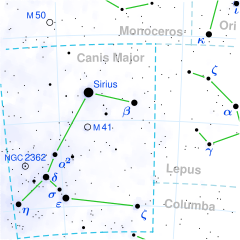Theta Canis Majoris
| Observation data Epoch J2000.0 Equinox J2000.0 (ICRS) | |
|---|---|
| Constellation | Canis Major |
| Right ascension | 06h 54m 11.399s[1] |
| Declination | −12° 02′ 19.061″[1] |
| Apparent magnitude (V) | 4.08[2] |
| Characteristics | |
| Evolutionary stage | Red giant |
| Spectral type | K4 III[2] |
| U−B color index | +1.69[3] |
| B−V color index | +1.43[3] |
| Astrometry | |
| Radial velocity (Rv) | +96.2±0.1[4] km/s |
| Proper motion (μ) | RA: −136.454 mas/yr[1] Dec.: −14.322 mas/yr[1] |
| Parallax (π) | 12.0676 ± 0.62 mas[1] |
| Distance | 270 ± 10 ly (83 ± 4 pc)[1] |
| Absolute magnitude (MV) | −0.36±0.15[5] |
| Details | |
| Mass | 1.5[6] or 0.89 – 0.94[7] M☉ |
| Radius | 33.01±0.75[8] R☉ |
| Luminosity | 304.9±7[8] L☉ |
| Surface gravity (log g) | 1.52[6] cgs |
| Temperature | 4196±43[8] K |
| Metallicity [Fe/H] | −0.34±0.09[6] dex |
| Rotational velocity (v sin i) | 2.72±0.40[4] km/s |
| Age | 7.94 or 8.71[7] Gyr |
| Other designations | |
| Database references | |
| SIMBAD | data |
Theta Canis Majoris (θ Canis Majoris) is a solitary,[10] orange-hued star near the northern edge[11] of the constellation Canis Major, forming the nose of the "dog".[12] The star is visible to the naked eye with an apparent visual magnitude of 4.08.[2] Based upon an annual parallax shift of 12.07 mas as seen from Earth,[1] it is located about 270 light years from the Sun. The star is moving away from Earth with a radial velocity of +96.2 km/s.[4]
This is an old, evolved K-type giant star with a stellar classification of K4 III.[2] Its mass is uncertain, and may be either 1.5[6] or around 0.9 times the Sun's mass. It is either 7.9 or 8.7 billion years old (assuming 0.94 – 0.89 M☉ as the mass)[7] and has expanded to 33 times the Sun's size.[8] The star is radiating 305 times the Sun's luminosity from its photosphere at an effective temperature of 4,200 K.[8]
References
[edit]- ^ a b c d e f Vallenari, A.; et al. (Gaia collaboration) (2023). "Gaia Data Release 3. Summary of the content and survey properties". Astronomy and Astrophysics. 674: A1. arXiv:2208.00211. Bibcode:2023A&A...674A...1G. doi:10.1051/0004-6361/202243940. S2CID 244398875. Gaia DR3 record for this source at VizieR.
- ^ a b c d Setiawan, J.; et al. (July 2004), "Precise radial velocity measurements of G and K giants. Multiple systems and variability trend along the Red Giant Branch", Astronomy and Astrophysics, 421: 241–254, Bibcode:2004A&A...421..241S, doi:10.1051/0004-6361:20041042-1.
- ^ a b Johnson, H. L.; et al. (1966), "UBVRIJKL photometry of the bright stars", Communications of the Lunar and Planetary Laboratory, 4 (99): 99, Bibcode:1966CoLPL...4...99J.
- ^ a b c Jofré, E.; et al. (2015), "Stellar parameters and chemical abundances of 223 evolved stars with and without planets", Astronomy & Astrophysics, 574: A50, arXiv:1410.6422, Bibcode:2015A&A...574A..50J, doi:10.1051/0004-6361/201424474, S2CID 53666931.
- ^ da Silva, L.; et al. (November 2006), "Basic physical parameters of a selected sample of evolved stars", Astronomy and Astrophysics, 458 (2): 609–623, arXiv:astro-ph/0608160, Bibcode:2006A&A...458..609D, doi:10.1051/0004-6361:20065105, S2CID 9341088.
- ^ a b c d Ayres, Thomas (2023-05-01). "In the Trenches of the Solar-Stellar Connection. VII. Wilson-Bappu 2022". The Astrophysical Journal Supplement Series. 266 (1): 6. Bibcode:2023ApJS..266....6A. doi:10.3847/1538-4365/acb535. ISSN 0067-0049. Theta Canis Majoris' database entry at VizieR.
- ^ a b c Stock, Stephan; Reffert, Sabine; Quirrenbach, Andreas (2018-08-01). "Precise radial velocities of giant stars. X. Bayesian stellar parameters and evolutionary stages for 372 giant stars from the Lick planet search". Astronomy and Astrophysics. 616: A33. arXiv:1805.04094. Bibcode:2018A&A...616A..33S. doi:10.1051/0004-6361/201833111. ISSN 0004-6361. Theta Canis Majoris' database entry at VizieR.
- ^ a b c d e Baines, Ellyn K.; Clark, James H., III; Schmitt, Henrique R.; Stone, Jordan M.; von Braun, Kaspar (2023-12-01), "33 New Stellar Angular Diameters from the NPOI, and Nearly 180 NPOI Diameters as an Ensemble", The Astronomical Journal, 166 (6): 268, Bibcode:2023AJ....166..268B, doi:10.3847/1538-3881/ad08be, ISSN 0004-6256
{{citation}}: CS1 maint: multiple names: authors list (link) - ^ "tet CMa". SIMBAD. Centre de données astronomiques de Strasbourg. Retrieved 2017-09-08.
{{cite web}}: CS1 maint: postscript (link) - ^ Eggleton, P. P.; Tokovinin, A. A. (September 2008), "A catalogue of multiplicity among bright stellar systems", Monthly Notices of the Royal Astronomical Society, 389 (2): 869–879, arXiv:0806.2878, Bibcode:2008MNRAS.389..869E, doi:10.1111/j.1365-2966.2008.13596.x, S2CID 14878976.
- ^ Kaler, James N. (March 8, 2013), "Theta and Lambda Canis Majoris", STARS, University of Illinois, retrieved 2017-09-08.
- ^ Crossen, Craig; Rhemann, Gerald (2012), Sky Vistas: Astronomy for Binoculars and Richest-Field Telescopes, Springer Science & Business Media, p. 112, ISBN 978-3709106266.

